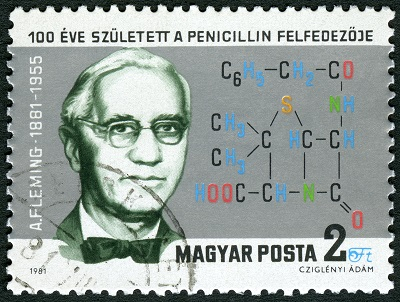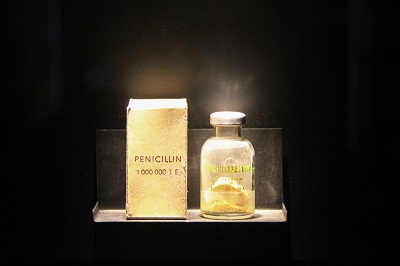

On August 6, 1881, Alexander Fleming was born at Lochfield Farm in Ayrshire. Fleming experienced life's difficulties as a child, but he also had a caring childhood and a love of the exterior. He studied at St. Mary's Medical School. Fleming's 1928 discovery of penicillin's bacterial-killing properties in his London laboratory was the first step toward discovering one of medicine's most important pillars: antibiotics.
Sir Alexander Fleming was a Scottish physician born in Ayrshire. Alec, as he was affectionately called, was the 2nd youngest of 7 siblings. His father passed away when he turned seven, but his mother kept the farm operational. Alec went to Kilmarnock Academy after finishing primary school at Loudon Moor and Darvel. He had a good time at school. Despite the fact that an outdoor play mishap left him with the appearance of a boxer for the remainder of his life.
Fleming moved to London when he was 13 to live with his doctor brother. He got a job as a clerk at a shipping company, which he hated. Fleming received a small inheritance from an uncle when he was 20 years old. He used this to follow in his brother's footsteps into medicine. Fleming studied at St Mary's Medical School. He finished his medical degree and received exactly every award and medal obtainable. despite being naturally bright and a quick learner.

A stamp showing the portrait of Alexander Fleming
A German scientist discovered syphilis-fighting drug salvarsan in 1910, which Fleming was the first to administer in the UK. Fleming attended a military hospital enclosed in a casino in Boulogne, France, during World War I, where Wright established a laboratory for investigating wound infections as a microbiologist. It was shown that the use of strong antiseptics on wounds could cause more harm than good. Instead, a mild solution of saline would be sufficient to keep wounds clean.
After the war, Fleming came back to St. Mary's and was promoted to assistant director of the Inoculation Department. When he succeeded Wright as principal in 1946, the department was retitled Wright-Fleming Institute. Lysozyme is an enzyme found in saliva and tears that plays a mild antiseptic role, which Fleming discovered in November 1921.
Fleming invented penicillin, the first antibiotic, in 1928. In the hospital where he worked, he grew bacteria cultures in petri dishes. As a result of a fungal spore contaminating one of the bacteria cultures, it grew into a fungal colony. Bacteria in the vicinity of the fungal colony did not grow as well as bacteria in other areas. Fleming inferred from this that a fungus-produced substance must be slowing the bacteria's development.
For his invention, Fleming received the Nobel Prize in Medicine. A variety of antibiotics were developed as a result of this discovery. These antibiotics are now used to treat many bacterial-caused illnesses, including lung and bladder infections. Despite the benefits, using antibiotics carries risks, such as resistance.
Penicillin was discovered in 1928 by Sir Alexander Fleming in his London lab, and its bacterial-killing properties laid the foundation for the discovery of one of medicine's most fundamental pillars: antibiotics. It took many years to discover a way to massproduce penicillin, and large-scale production did not begin until 1945.
However, Fleming is still regarded as the father of antibiotics, and without his discovery, we would be unable to treat many bacterial infections. This means that, in the absence of antibiotics, even a minor infection could be fatal. Furthermore, antibiotics make surgery much safer, and people with weakened immune systems can now recover quickly from bacterial infections. However, bacteria are becoming resistant to antibiotics, as Fleming predicted in his Nobel Prize acceptance speech in 1945.

Nobel Prize Museum, Penicillin Bottle
Sarah, Fleming's first wife, died in 1949. They had one son, Robert, and had been married for 34 years. After that, Fleming married Greek research assistant Amalia Voureka Coutsouris in 1953. They lived happily together.
Florey and Fleming were knighted in 1944. In 1945, Fleming, Florey, and Chain were awarded the Nobel Prize in Medicine for their work on penicillin. Despite Fleming's rise to fame, he always acknowledged that it was Florey and Chain who made penicillin useful.
Alexander Fleming died of coronary thrombosis at home on March 11, 1955, at the age of 74. He had been suffering from what he thought was gastric upset for several weeks. In 1955, he was laid to rest in St Paul's Cathedral in London.
The Churchill-Fleming Non-Relationship: For years, the story has circulated on the Internet that Sir Alexander Fleming saved Churchill's life. According to Keeney, Churchill is secured from drowning in a Scottish lake by a farm boy named Alex. Churchill calls Alex some years later to thank him for supporting his unsustainable medical schooling. In 1928, Alex was awarded for discovering that certain bacteria cannot develop in some vegetable molds.
Fleming was born on August 6, 1881, in Ayrshire. He loved the outdoors and had a challenging but happy childhood. Fleming spent his entire life working with St Mary's Medical School, where he attended school. The first step toward understanding one of medicine's most crucial pillars—antibiotics—was made possible by Sir Alexander Fleming's 1928 discovery of penicillin's bacterial-killing properties in his London laboratory.
Q1. What illness did penicillin initially treat?
Ans. In the United States, streptococcal septicemia was successfully treated for the first time in 1942.
Q2. Why was penicillin given that name?
Ans. As a result of isolating the mould and discovering it belonged to the Penicillium genus, Fleming obtained an extract from the mould and named its active ingredient penicillin.
Q3. How has penicillin affected society?
Ans. By treating some bacterial infections, penicillin had a profound impact on medicine. A hundred additional antibiotics were developed as a result of its breakthrough, improving the quality of life of those whose lives would have been at risk without antibiotics.